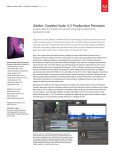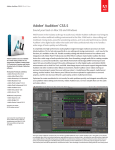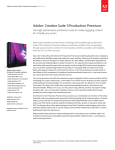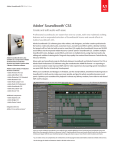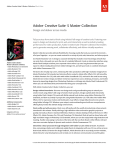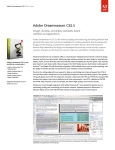Download Adobe Premiere Pro CS5.5 v5.5, Win
Transcript
Adobe Premiere Pro CS5.5 What’s New d Adobe® Premiere® Pro CS5.5 Unleash creativity with high-performance editing tools Get a faster editing workflow with Adobe Premiere Pro CS5.5 software, the native 64-bit, cross-platform video production solution that comes with Adobe OnLocation™ CS5 and Adobe Encore® CS5 software. What’s included: • Adobe Premiere Pro CS5.5 • Adobe OnLocation CS5 • Adobe Encore CS5 • Adobe Device Central CS5.5 • Adobe Bridge CS5 • Adobe Media Encoder CS5.5 Adobe Premiere Pro CS5.5 is also available as a component of Adobe Creative Suite® 5.5 Production Premium and Adobe Creative Suite 5.5 Master Collection. Adobe Creative Suite 5.5 Production Premium combines the full new versions of: •Adobe Premiere Pro CS5.5 •Adobe After Effects® CS5.5 •Adobe Photoshop® CS5 Extended •Adobe Audition® CS5.5 •Adobe Flash® Catalyst CS5.5 •Adobe Flash® CS5.5 Professional •Adobe Illustrator® CS5 •Adobe OnLocation™ CS5 •Adobe Encore® CS5 Additional components: • Adobe Dynamic Link • Adobe Bridge CS5 • Adobe Device Central CS5.5 Building on its robust toolset with the faster-than-ever Mercury Playback Engine, Adobe Premiere Pro CS5.5 extends breakthrough performance to more laptop and desktop computer GPUs. Get real-time feedback for more GPU-accelerated features, including effects (Directional Blur, Fast Blur, Invert) and transitions (Additive Dissolve and the new Film Dissolve), as well as Interpret Footage and Time Remapping options—while you work smoothly at 4K and higher resolutions. Open projects quickly and refine multilayer, effects-rich sequences without rendering. Easy access to customizable keyboard shortcuts enables a robust keyboard-driven workflow, letting you edit the way you want. Powerful editing-tool enhancements give you more precision and control, and new dual-system sound support from the new Merge Clips feature lets you quickly sync video with high-quality audio recorded on separate devices like location recorders, perfect for DSLR or RED workflows. ow, integration between Adobe Premiere Pro and Adobe Story, an Adobe CS Live online service* †, lets N you collaboratively write scripts and create metadata-rich, production-ready assets, speeding your editing workflow. Start by importing or developing your script in Adobe Story, and then import it directly into Adobe Premiere Pro, where you can align the script to spoken dialogue in each clip. Scenes in the Adobe Story script—and the metadata associated with them—can be matched to clips in your project. Metadata helps eliminate hours of routine work by enabling you to effortlessly locate all of the takes of a specific shot and quickly search dialogue, scene elements, or character names. Integrates with Adobe CS Live online services* † Among the many new timesaving features in Adobe Premiere Pro CS5.5 are powerful editing-tool enhancements, dual-system sound support, and the faster-than-ever Adobe Mercury Playback Engine, which extends breakthrough performance to more desktop and laptop computer GPUs. Top features •Numerous productivity enhancements, including dualsystem sound support with merged clips and more intuitive keyboarddriven editing (Page 3) •More performance gains with the Mercury Playback Engine (Page 5) •Multiscreen delivery presets with Adobe Media Encoder (Page 5) • Fast, efficient audio post-production workflows with Adobe Audition CS5.5 (Page 7) •Streamlined workflow thanks to direct integration with Adobe Story* † (Page 7) •Closed-captioning support (Page 8) •Expanded native support for RED digital cinema workflows (Page 8) • Enhanced native support fo Canon XF video (Page 9) •Timesaving collaboration and improved open workflows (Page 9) Adobe Premiere Pro CS5.5 offers the best file-based (tapeless) workflows in the industry, and Adobe continually extends and improves support for the latest formats. In this release, enhanced support for Canon XF media allows for simple direct access to clips right from the Media Browser. In post-production, true native support lets you get to work immediately—with absolutely no transcoding or rewrapping—retaining the original pristine quality of your footage throughout the editing workflow. Freely mix and match any formats and create high-quality editorial effects directly in the timeline, with hundreds of nonlinear editing features optimized for creative productivity. New support for importing closed-captioning data in 608 and 708 format offers flexibility when producing broadcast content, and enhanced metadata capabilities, such as improved Speech Analysis, help you find assets and speed up editing further. New watch folders, customizable presets, and contextual menus in Adobe Media Encoder (a separate 64-bit application included with Adobe Premiere Pro) make it easier for you to output clips and edited sequences for delivery to the multiscreen environment. Encoding takes place in the background, so you can continue editing, and new audible alerts let you know when your encoding jobs are complete. Tap into the audio post-production power offered in Adobe Audition CS5.5 software (available separately or as part of Adobe Creative Suite 5.5 Production Premium). Thanks to tightly integrated, roundtrip workflows with Adobe Premiere Pro CS5.5, you can use the robust tools in Audition to edit and sweeten your soundtracks. Seamless integration with other Production Premium components, along with enhanced interoperability with Apple Final Cut Pro, lets you put the powerful, flexible toolset in Adobe Premiere Pro CS5.5 to use in any production pipeline. With Adobe Premiere Pro CS5.5, you can: Subscription option Get the same product with low monthly payments. Visit www.adobe. com/go/cssubscription to learn more. Improve your editing workflow. Get more performance gains, thanks to the faster-than-ever native 64-bit Adobe Mercury Playback Engine, which now supports more laptop and desktop computer GPUs. With industry-leading native file-based format support, you can begin editing virtually any video, image, or audio format as soon as you import it. True native format support lets you enjoy immediate, transcode-free import and render-free playback. And because you never have to transcode or rewrap your footage, you always work with the highest quality source material. Work smoothly with complex sequences at HD and film resolutions using an improved, highly efficient keyboard-driven workflow, and boost productivity with new dual-system sound support with merged clips and other timesaving features suggested by users. With intuitive editing tools and innovative metadata features such as newly enhanced Speech Analysis, you can edit even more efficiently. Collaborate more effectively. Bring the creative benefits of Adobe tools to your project and work in an open, extensible post-production environment. Improved roundtrip editing capabilities with Apple Final Cut Pro extend the easy project and content exchange with other Adobe software and Avid editing software, making it easier to collaborate on projects in multitool post-production pipelines. Develop scripts collaboratively using Adobe Story* †, and now import them straight into Adobe Premiere Pro, without having to first send them to OnLocation. Adobe Premiere Pro CS5 introduced integration with CS Review* †, another CS Live online service, making it easier for clients and teammates to review and make frame-accurate comments on works in progress. Combine this helpful service with roundtrip workflows to bring in Apple Final Cut Pro and Avid NLE sequences to simplify the process of gathering client and team feedback on works in progress. Deliver your finished media practically anywhere. Produce video optimized for distribution to practically any video or device format. Save time by using the redesigned interface, new presets, intuitive context menus, and dramatically improved watch folder support in Adobe Media Encoder to batch encode your project to multiple delivery formats, quickly, simply, and in the background. Adobe Premiere Pro CS5.5 What’s New 2 Who uses Adobe Premiere Pro? 64-bit operating system required Adobe Premiere Pro CS5.5 runs only on 64-bit operating systems, such as Mac OS X 10.5 or later, Microsoft® Windows Vista® 64-bit Edition, or Windows 7 64-bit Edition. Adobe Media Encoder supports both 64-bit and 32-bit versions of Windows, and like both Adobe Premiere Pro and After Effects, is 64-bit only on Mac OS X. For more information about optimizing performance, see the complete system requirements on the last page of this document. Video and film editors and other post-production professionals use Adobe Premiere Pro to assemble compelling stories and other types of video content from live-action video footage, still and animated images, sound, and music. The types of projects they create range from short-form commercials and videos to long-form broadcast programming, sporting and event coverage, and corporate and feature films. Adobe Premiere Pro offers a comprehensive post-production toolset and industry-leading file-based workflows that speed every stage of production. Timesaving integration with other essential Adobe software, including Production Premium components, as well as with other NLEs (Final Cut Pro and Avid editing software), allows you to bring the creative benefits of Adobe tools to every video project. Motion graphics designers and visual effects artists turn to Adobe Premiere Pro for a tightly integrated, timesaving workflow, video ingest, and editing. These creative professionals especially appreciate being able to work in real time on footage at HD and film resolutions, thanks to the Mercury Playback Engine and broad format support including high-quality 10-bit mastering and archiving codecs. In addition to being able to open each others’ project files and easily paste elements between After Effects and Adobe Premiere Pro (when they’re used together as part of Production Premium), After Effects users can easily use the now faster Dynamic Link to send compositions to Adobe Premiere Pro sequences, where changes made in After Effects show up immediately in the Adobe Premiere Pro timeline. Top new features of Adobe Premiere Pro CS5.5 Numerous productivity enhancements, including dual-system sound support with merged clips and more intuitive keyboard-driven editing As video producers at all levels try to accomplish more with fewer resources, high-performance tools that help get the job done faster and more efficiently—with top-notch results—are essential. Adobe Premiere Pro CS5.5 includes a number of of new features and enhancements that take editing efficiency to a new level. Merge Clips feature for dual-system sound support More and more, video productions use dual-system sound in their audio recording workflow, thanks to widespread use of DSLR cameras that shoot HD video, and use of digital cinema cameras such as the RED ONE and Silicon Imaging SI-2K. The new Merge Clips feature in Adobe Premiere Pro CS5.5 provides dual-system sound support that enables you to quickly match audio and video tracks originally recorded on separate devices and media. Dual-system sound workflows give you more control over audio quality by recording sound on a standalone digital audio recorder. But what you gain in audio quality by recording sound on a device other than your camera comes at a price—sound and picture need to be synced in post-production, a process that’s typically time-consuming and tedious. Using the new Merge Clips feature in Adobe Premiere Pro CS5.5, you can quickly combine separate audio and video source files into a single merged clip. The Merge Clips dialog box lets you choose In points and Out points, timecode, or a numbered clip marker as the sync reference. The ability to use In/Out points as sync references is essential when matching audio clips to video clips that were shot on DSLR cameras, which typically do not supply timecode without additional software or special plug-ins. Referencing a numbered clip marker lets you sync clips based on an event that occurs somewhere in the middle of a shot—for example, the popping of a champagne cork. With the Merge Clips command, you can sync up to 16 audio clips to a single video clip. The new Merge Clips dialog box in Adobe Premiere Pro CS5.5 lets you quickly choose different sync references, so that audio and video recorded on different devices can be easily aligned for synchronized playback. Adobe Premiere Pro CS5.5 What’s New 3 A merged clip’s video track and source audio channels can be mapped to targeted tracks in the timeline, which makes assembling sequences easier, faster, and more efficient. Multiple track targeting helps support keyboard-driven Insert/Overwrite (previously called Overlay) editing, which is faster than dragging and dropping clips into the timeline. To streamline project management, the original master component clips can be deleted from the project, leaving only the merged clips. For added flexibility, you can define separate In and Out points for the audio and video portions of merged clips. When you do so, a single audio In point applies to all of the component audio clips. Additionally, merged clips can be exported as Extensible Markup Language (XML) files that can be imported into Apple Final Cut Pro or as Advanced Authoring Format (AAF) files for exchange with Avid NLEs such as Media Composer. The Metadata panel displays vital information about each of the component (source) clips that the merged clip is based on, so each clip’s metadata can be viewed individually. Alternately, a pulldown menu lets you choose to look at metadata for all of the component files simultaneously. Numerous improvements that boost editing efficiency Take advantage of user-requested enhancements and enjoy more efficient workflows. For example, Adobe Premiere Pro CS5.5 gives you more options for: Customizing and accessing keyboard shortcuts • Use widely accepted NLE shortcuts that you can customize to suit your needs. • Assign keyboard shortcuts faster using the redesigned Keyboard Shortcuts dialog box. • Get easier access to updated keyboard layout presets for Avid Media Composer and Final Cut Pro-style shortcuts. • Find clip, sequence, and In/Out markers faster using keyboard shortcuts that are now displayed in the Keyboard Shortcuts menu. Performing Insert/Overwrite edits, extracting frames from a sequence, and adding keyframes • Perform Insert/Overwrite (formerly Overlay) edits more easily, thanks to a new drag-and-drop graphic overlay button in the Program Monitor. • Extract frames from a sequence in the timeline and automatically position the current time indicator (CTI) to the point of extraction using the improved Extract command. Previously, the CTI stayed in place, unaffected by the ripple edit, which often left the playhead in a new and unexpected place in the sequence. Perform Overwrite or Insert edits more easily, thanks to a new graphic overlay button that appears when you drag clips from the Project panel into the Program Monitor. • Save time with the ability to add keyframes directly in the timeline using the Selection or Pen tool in the Effect Controls panel without having to first enable keyframing. Decoupling media • Save time when creating overlapping edits with the Unlink command, which now decouples the audio portion of a clip while automatically deselecting the video portion. In addition, the Unlink command now works on multiple selected clips in a sequence. Adobe Premiere Pro CS5.5 What’s New 4 More performance gains with the Mercury Playback Engine Supported Nvidia Graphics Cards The list of graphics cards that are compatible with Adobe Premiere Pro CS5.5 is updated on a regular basis. For an up-to-date list of supported cards, please see www.adobe.com/ go/64bitsupport. For system requirements and compatibility, please see www.nvidia.com. The 64-bit Mercury Playback Engine brought extraordinary performance and stability to Adobe Premiere Pro CS5. In Adobe Premiere Pro CS5.5, the Mercury Playback Engine takes performance to the next level, so that you get even faster playback of mixed-format timelines and more GPU‡-accelerated effects and transitions. And the Mercury Playback Engine in Adobe Premiere Pro CS5.5 supports additional Nvidia graphics cards for laptop and desktop computers, so you can enjoy high-performance, real-time editing in the editing suite and on location. New GPU-accelerated features, effects, and transitions in Adobe Premiere Pro CS5.5 include: • Speed-change features. GPU-accelerated Time Remapping, Speed Change, and Backwards functions enable you to create high-quality slow- or fast-motion footage and play clips backwards, all in real time without first having to render them. • Footage interpretation options. Easily modify the properties of clips using GPU-accelerated effects that give you control over frame rate, aspect ratio, field order, alpha channels, and pulldown removal. • Field-order processing. Eliminate unwanted interlacing artifacts with GPU-accelerated operations that give you control over field order, interlacing, deinterlacing, and flicker removal. • Transitions, including the new Film Dissolve. Move between clips using GPU-accelerated Additive Dissolve to add the color information from clip B to clip A, and then subtract the color information of clip A from clip B. The new Film Dissolve transition lets you achieve a different look when moving between clips by using linear color blending to prevent certain edge and halo artifacts, such as fringing, which appears when high-contrast saturated colors are blended together. A B D C Transitioning between two clips using Additive Dissolve (A and B) and the new Film Dissolve (C and D). Notice the difference in color saturation and in the edges around the actor’s hair (A and C) as well as the appearance of his left shoulder. • Blur effects. Use GPU-accelerated Fast Blur to quickly add blur to large areas of your clips, create the illusion of motion using Directional Blur, and—thanks to GPU acceleration—see the results in real time. Multiscreen delivery presets with Adobe Media Encoder Reaching audiences wherever they are and on whatever device they use to watch video content is an essential requirement of modern video production. New presets, intuitive context menus, and dramatically enhanced watch folder support in Adobe Media Encoder CS5.5, a separate 64-bit ‡ Using NVIDIA graphics cards; depending on system configuration and file types. Adobe Premiere Pro CS5.5 What’s New 5 application included with Adobe Premiere Pro CS5.5, make outputting your work for delivery everywhere a simple and intuitive process. Because there is no single, universal set of encoding parameters that can accommodate every business and customer need, Adobe Media Encoder adds to its already extensive list of output presets to further streamline your encoding workflow. The existing presets covered delivery to devices that ranged from iPhones to digital cinema resolutions. The new presets encompass a range of screen sizes from smartphones to tablets and desktop PCs to televisions, and are optimized for device-specific encoding profiles and bitrates, including: Expand your creative toolset Open up more creative possibilities as you tackle a broad spectrum of planning, production, and post-production tasks with Adobe Creative Suite 5.5 Production Premium. Get more creative power at an appealing price. In addition to Adobe Premiere Pro, Encore, and OnLocation, CS5.5 Production Premium offers the latest versions of Adobe After Effects, Photoshop Extended, Flash Professional, Flash Catalyst, Audition, and Illustrator. Move up to Production Premium to: Create rich visual effects and sophisticated motion graphics. After Effects gives you everything you need to create opening titles, animated graphics, and visual effects, as well as to create and move images and video in 3D. Eliminate unwanted camera movement and compensate for irregularities caused by camera motion with Warp Stabilizer. Tablet and Mobile devices (frame size: 512x288) • Phone + Tablet 3G (350kbps) • Phone + Tablet Low (500kbps) • Phone + Tablet Wifi (700kbps) Desktop and Television (SD) (frame size: 768x432) • PC + TV, SD, Med, 16x9 (1200kbps) • PC + TV, SD, High, 16x9 (1800kbps) Desktop and Television (HD) (frame size: 1280x720) • PC + TV, HD, Low, 16x9 (2500kpbs) • PC + TV, HD, High, 16x9 (3500kbps) One Source, Multiple Outputs using Watch Folders Watch folders allow Adobe Media Encoder to monitor a selected set of locations on your computer for newly added material. Watch folders existed in Adobe Media Encoder CS5, but in CS5.5 this important feature’s workflow has been improved and its status elevated in the redesigned user interface. Once a new asset is detected, Adobe Media Encoder automatically adds the item into the encoding queue and processes it based on the settings you selected when you created the watch folder. This valuable timesaving feature makes it easier for you to convert assets for viewing on multiple devices at different screen resolutions and bitrates. Enhance graphics for video. Create and enhance 3D graphics and motion-based content and prepare still images and text for all your projects with Adobe Photoshop CS5 Extended. Work fast with crossplatform 64-bit support, and create stunning HDR images for video backdrops. Record, edit, mix, master, and sweeten audio. With Audition CS5.5—now available for Mac OS and Windows—enjoy a smooth workflow with a fast new audio playback engine, royalty-free content, and deep integration with Adobe Premiere Pro CS5.5. Design interactive experiences. Create video portfolios and other engaging interactive media with easy-to-use Flash Catalyst or with the full power of Flash Professional. For more information, see Adobe Creative Suite 5.5 Production Premium What’s New. To make it easier to output your work to virtually any video and device format, the new Adobe Media Encoder user interface provides a dashboard-like view of the status of multiple background renders, so you can see progress at a glance as you continue working in Adobe Premiere Pro and Encore. The new interface includes three sections—the Queue pane, the Current Encode pane, and the Watch Folders pane—that can be independently open or closed. Progress bars in both the Queue and Current Encode panes let you monitor encoding as it takes place. Adobe Premiere Pro CS5.5 What’s New 6 In addition, the ability to drag and drop sequences directly from Adobe Premiere Pro into the Adode Media Encoder queue gives your encoding workflow added flexibility. And because Adobe Media Encoder is optimized to take full advantage of modern multicore CPUs, it efficiently encodes your content in the background, enabling you to continue creative work in the foreground, further boosting your productivity. To help you keep track of your encoding jobs, Adobe Media Encoder now lets you specify audible alerts to signal when items in the queue are successfully completed or completed with errors. About Adobe Audition CS5.5 Adobe Audition is the cross-platform digital audio editor that audio and video professionals rely on. With its new high-performance audio playback engine that leverages multicore processors, an enhanced effects workflow that lets you adjust parameters while playing back audio, and powerful native 5.1 multichannel support, Audition offers best-in-class audio and multitrack mixing tools, powerful sweetening options, and rock-solid performance to handle a wide range of audio post-production tasks quickly and efficiently. Another new feature in Adobe Media Encoder CS5.5 supplies a number of options for importing still image sequences as a single video file. This makes it easier to work with popular production formats such as DPX. Fast, flexible roundtrip audio post-production workflows with Adobe Audition (available separately) Adobe Premiere Pro CS5.5 offers tight integration with Adobe Audition CS5.5 (now on Mac OS and Windows), the audio editing and sweetening solution designed for video professionals, available separately or as part of Adobe Creative Suite 5.5 Production Premium (see sidebar on page 6). Using the new Edit In Adobe Audition command, you can send individual clips, entire sequences, or just the selected work area—complete with a reference video—directly to Audition for audio editing and sweetening. When you send a sequence to Audition, it opens as a multitrack audio project. When you’ve finished editing your audio tracks, the Export To Adobe Premiere Pro command in Audition lets you quickly send the multitrack file back to Adobe Premiere Pro. Open Media Framework (OMF) support in Adobe Premiere Pro and Audition makes it possible to export high-quality audio projects to Avid ProTools, making collaboration with audio editors, remixers, and sound designers more efficient. Streamlined workflow thanks to direct integration with Adobe Story* † In Adobe Premiere Pro CS5.5, you can speed your editing workflow by importing your Adobe Story scripts, complete with metadata, directly into Adobe Premiere Pro CS5.5 without having to first go through Adobe OnLocation. The Speech Analysis area of the Metadata panel in Adobe Premiere Pro CS5.5 contains a new pane called Embedded Adobe Story Script. Being able to see the embedded script in this manner makes it easier to compare the speech analysis results with the actual written script, and align them automatically. About Adobe Story* † Adobe Story, a CS Live online service*† that’s available both separately and as a desktop application, is a collaborative scriptwriting tool that can help accelerate the process of turning screenplays and other types of narratives into finished media by making vital information embedded in the script available as metadata. If your production started with a written script that matches the spoken dialogue in your clips, the speech analysis process in Adobe Premiere Pro can use your written script as a reference, aligning the written script and spoken dialogue so they match exactly. Learn about the newest features of CS Live online services, which are complimentary until April 12, 2012. Visit www.adobe.com/go/cslive for details. Embedded Adobe Story* † scripts are displayed in the Adobe Premiere Pro CS5.5 Metadata panel, making it easy to tell which clips have a script attached to them. Adobe Premiere Pro CS5.5 What’s New 7 You can also import Adobe Story* † ASTX files and attach them to multiple selected clips in the Adobe Premiere Pro CS5.5 Project panel. When attached to clips, scenes from the script are matched to the appropriate video clips by a predefined scene number that’s stored in both the script and the clip’s XMP metadata. This helps eliminate hours of routine work by enabling you to effortlessly locate all of the takes of a specific shot or search dialogue, scene elements, or character names. Better still, that same metadata is retained throughout the production workflow and can be passed through to Adobe Encore, where it can be used as the basis for DVD and Blu-ray Disc chapter titles. When you deliver your Encore projects as web DVDs, the script metadata makes the web DVD content searchable. Closed-captioning support About 608 and 708 caption data 608 caption data is used in analog NTSC video for North American markets and in DVD production. 708 caption data is used in Advanced Television Standards Committee (ATSC) digital video streams. Closed-captioning requirements are expanding, both because of new regulations and because the service benefits viewers. As demand for captioned content grows to include both on-air and online content, broadcasters and content producers are looking for new ways to streamline the process and maximize their investments in having captions created. With support for 608 and 708 closed captions through the SCC and MCC file formats, Adobe Premiere Pro CS5.5 now offers the ability to sync closed captions to video sequences and display closed-captioning data in these file formats. This enables you to confirm that the captioning data is accurate and properly synced to the sequence. In addition, captions are visible in the Program Monitor during scrubbing, bypassing the need to run a closed-caption track through a television set for decoding before it can be viewed. Adobe Premiere Pro CS5.5 converts 608 closed-captioning data to 708 closed-captioning data, and vice versa. A new software development kit (SDK) makes the closed captioning data available to both Adobe and various Adobe partners for display and export over FireWire, SDI, HD-SDI, and other third-party hardware options. Expanded native support for RED digital cinema workflows About RED RMD files RED RMD files contain information about how the shot is graded in software such as REDCINE-X; it acts as a sidecar file alongside the R3D file holding these values. Adobe Premiere Pro imports and applies these settings on import, so that important decisions about how to interpret the color of the shot are not left behind. Building on the fully native RED R3D format support offered in Adobe Premiere Pro CS5, the RED R3D Source Settings dialog box has been redesigned, and offers intuitive controls to those who work regularly with RED media. In addition to the ability to save and load the latest versions of RMD—as well as the ability to create custom presets—you can now pick a white point and use either a histogram or a five-point curves interface to adjust red, green, blue, RGB, or Luma values for a clip. You can choose which Color Science version is used, and FLUTs, Lift, Gamma, and Gain settings are all supported. In addition, you can now apply the same source settings to multiple selected RED clips simultaneously. You can view and edit color settings and metadata in RED footage. Adobe Premiere Pro CS5.5 What’s New 8 These features make Adobe Premiere Pro an even better choice for on-set and dailies workflows when working with RED content, offering deep control over crucial color settings in the context of an efficient native workflow, and enable close integration with REDCINE-X software via RMD interchange. About spanned clips With Relay Recording, Canon XF cameras automatically switch recording from internal memory to CF cards when their internal drive becomes full, so recording continues uninterrupted, creating spanned clips. Enhanced native support for Canon XF video Building on its industry-leading native file-based format support, Adobe Premiere Pro CS5.5 offers enhanced native support for Canon XF footage. Now you can preview XF footage in the Project panel, view and edit camera metadata in the Metadata panel, and take advantage of metadata throughout your pre- and post-production workflows. The Media Browser panel in Adobe Premiere Pro CS5.5 lets you navigate to and select XF files, which can now be displayed as video clips instead of files and folders. Because Adobe Premiere Pro supports the XF format natively, the files import immediately, without transcoding or rewrapping, preserving the pristine quality of the original source footage along with all of the valuable metadata associated with the clips. In addition, the Media Browser now treats spanned clips from Canon XF video cameras as a single asset. When dragged from the Media Browser panel into the Project panel, spanned clips are displayed as one file, preventing clutter. Timesaving collaboration and improved open workflows Reviewing works in progress typically involves uploading files to an FTP site, sending email notifications to let the appropriate parties know they can download the files, and then scheduling meetings to get feedback. Adobe Premiere Pro CS5 provided a powerful way to conduct reviews thanks to integration with Adobe CS Review* †, making it easier for clients and teammates to review and make frame-accurate comments on works in progress. Integration with Adobe CS Review* † enables: • Clients and teammates to take part in reviewing video sequences using just a web browser and easy-to-use annotation tools Integration with Adobe CS Review* † streamlines the review and approval process. • Reviewers to make frame-accurate comments that visually correlate to the Adobe Premiere Pro timeline. • You to hold fewer real-time meetings by reducing confusion over which frames comments pertain to. A new dialog box in Adobe Premiere Pro CS5.5 lets you use preset export settings that are optimized for CS Review* † to quickly encode your sequence or clips, and then send them to CS Review. Because the encoding is handled by Adobe Media Encoder (a separate 64-bit application The new export settings dialog box in Adobe Premiere Pro CS5.5 provides visual feedback and convenient presets for tailoring encoding for output to Adobe CS Review, a CS Live online service* †. Adobe Premiere Pro CS5.5 What’s New 9 included with Adobe Premiere Pro CS5.5), transcoding takes places in the background so you can continue editing without delay. You can also encode just the Adobe Premiere Pro sequence work area, which can be easily defined using new Set In Point and Set Out Point buttons. High, medium, and low bitrate settings provide control over encoding quality, while the estimated size of the output file is displayed, allowing you to tailor your output so it matches the available bandwidth and type of network connection that your teammates or clients are using. Adobe Device Central Adobe Premiere Pro CS5.5 includes Adobe Device Central CS5.5, which allows you to simplyify the production of innovative and compelling content for smartphones and other consumer electronic devices. Save time by automating testing and simulating accelerometer, geolocation multi-touch device inputs, and network performance of mobile content across a dynamically updated library of device profiles. Now with support for Webkit, HTML5, and the latest versions of Adobe Flash Player software, Adobe Device Central CS5.5 helps video professionals deliver engaging experiences to millions of mobile subscribers and consumers of content on many devices. When CS Review* † is combined with roundtrip workflows to bring in Apple Final Cut Pro and Avid NLE sequences the process of gathering client and team feedback on works in progress is further simplified. Enhanced roundtrip editing with Apple Final Cut Pro Improved roundtrip editing capabilities with Apple Final Cut Pro make it easier to collaborate on projects in which teammates, clients, or other production facilities utilize a variety of editing and post-production software tools. For example, when you import and export project files between Adobe Premiere Pro CS5.5 and Final Cut Pro, you can adjust the volume on Stereo As Mono clips, and adjust the scaling of a clip when its pixel aspect ratio (PAR) is different from that of the sequence. Additionally, you can export clips that have been modified by the 3-Way ColorCorrector, retaining approximate settings, which helps to eliminate guesswork associated with manually re-creating color-correction results that previously did not transfer with the media asset. Still using Adobe Premiere Pro CS4/CS3? For those still using Adobe Premiere Pro CS4 or CS3, upgrading to Adobe Premiere Pro CS5.5 also gives you the chance to catch up on all the great features added in Adobe Premiere Pro CS5. These include tighter tool integration, support for more video formats, and workflow enhancements that accelerate turnaround times, as well as the following: • Industry-leading performance with the Adobe Mercury Playback Engine. Edit in the field, get faster playback of mixed-format timelines, and take advantage of the new GPU-accelerated, 64-bit Adobe Mercury Playback Engine, now on workstations and laptops. • Native 64-bit operating system support. Take full advantage of all available system RAM—up to 192GB on modern workstations—so you can run multiple software applications at the same time, opening the door to powerful timesaving, multitasking workflows. • Extensive native file-based format support. Edit material in virtually any format and from nearly any device, thanks to broad native format support that lets you enjoy instant, transport-free import and render-free playback. • Unparalleled Adobe integration. Effortlessly move assets between Adobe Premiere Pro and other Adobe Creative Suite Production Premium components—Adobe After Effects, Adobe Photoshop Extended, Adobe Illustrator, Flash Catalyst, and Adobe Audition. • Efficient collaboration. Collaborate openly and effectively with clients and team members with Adobe CS Live online services* † (available separately), including CS Review, Adobe Story, and Acrobat.com. • Timesaving XMP metadata. Speed up your post-production workflow with metadata acquired during preproduction and production. • Industry-leading Blu-ray Disc authoring. Master your HD projects to Blu-ray Disc with Encore CS5 (included with Adobe Premiere Pro). • GPU-accelerated Ultra keyer. Easily achieve complex keys on challenging footage with the GPU-accelerated Ultra, which typically keys in real time (using NVIDIA graphics cards, depending on system configuration and file types). Adobe Premiere Pro CS5.5 What’s New 10 Adobe Premiere Pro CS5.5 also includes these additional features that have been added in free updates to Adobe Premiere Pro CS5: · Red Rocket support · Support for Mysterium X and the latest Color Science · RED RMD support for editing color-graded footage from REDCine-X tools · Native Sony XDCAM support · Native JVC QuickTime support · Enhanced native DPX format support · Improved color grading · Broadcast WAV support For more detailed information, see Adobe Premiere Pro CS5 What’s New. About Adobe Systems Incorporated Adobe is the world’s leading provider of software solutions to create, manage, and deliver highimpact, reliable digital content. For more information, visit www.adobe.com. Adobe Premiere Pro CS5.5 What’s New 11 System Requirements Adobe Premiere Pro CS5.5 and Encore CS5 Mac OS Windows •Multicore Intel® processor with 64-bit support •Intel® Core™2 Duo or AMD Phenom® II processor; 64-bit support required •Mac OS X v10.5.8 or v10.6.3; Mac OS X v10.6.3 required for GPUaccelerated performance •2GB of RAM (4GB or more recommended) •10GB of available hard-disk space for installation; additional free space required during installation (cannot install on a volume that uses a case-sensitive file system or on removable flash storage devices) •7200 RPM hard drive for editing compressed video formats; RAID 0 for uncompressed •1280x900 display with OpenGL 2.0–compatible graphics card •Adobe-certified GPU card for GPU–accelerated performance; visit www.adobe.com/go/premiere_systemreqs for the latest list of supported cards •Core Audio–compatible sound card •DVD-ROM drive compatible with dual-layer DVDs (SuperDrive for burning DVDs; external Blu-ray burner for creating Blu-ray Disc media) •64-bit operating system required: Microsoft® Windows Vista® Home Premium, Business, Ultimate, or Enterprise with Service Pack 1 or Windows® 7 •2GB of RAM (4GB or more recommended) •10GB of available hard-disk space for installation; additional free space required during installation (cannot install on removable flash storage devices) •7200 RPM hard drive for editing compressed video formats; RAID 0 for uncompressed •1280x900 display with OpenGL 2.0-compatible graphics card •Adobe-certified GPU card for GPU–accelerated performance; visit www.adobe.com/go/premiere_systemreqs for the latest list of supported cards •Adobe-certified card for capture and export to tape for SD/HD workflows •QuickTime 7.6.2 software required for QuickTime features • OHCI-compatible IEEE 1394 port for DV and HDV capture, export to tape, and transmit to DV device •Adobe Flash® Player 10 software required to play back DVD projects exported as SWF files •Sound card compatible with ASIO protocol or Microsoft Windows Driver Model •Broadband Internet connection required for online services and to validate Subscription Edition (if applicable) on an ongoing basis* •DVD-ROM drive compatible with dual-layer DVDs (DVD+-R burner for burning DVDs; Blu-ray burner for creating Blu-ray Disc media) •QuickTime 7.6.2 software required for QuickTime features •Adobe Flash® Player 10 software required to play back DVD projects exported as SWF files •Broadband Internet connection required for online services and to validate Subscription Edition (if applicable) on an ongoing basis* Adobe OnLocation CS5 Mac OS Windows •Multicore Intel® processor •Intel® Pentium® 4 or AMD Athlon® 64 processor (Intel Core™2 Duo or AMD Phenom® II recommended) •Mac OS X v10.5.8 or v10.6 •1GB of RAM •400MB of available hard-disk space for installation; additional free space required during installation (cannot install on a volume that uses a case-sensitive file system or on removable flash storage devices) •5400 RPM hard drive for recording; 13GB of available hard-disk space for each hour of recording •Microsoft® Windows® XP (32 bit) with Service Pack 2 (Service Pack 3 recommended) or Windows® 7 •1GB of RAM •400MB of available hard-disk space for installation; additional free space required during installation (cannot install on removable flash storage devices) •1280x900 display with OpenGL 2.0–compatible graphics card •5400 RPM hard drive for recording; 13GB of available hard-disk space for each hour of recording •Core Audio–compatible sound card •1280x900 display with DirectX 9.0c–compatible graphics card •DVD-ROM drive •OHCI–compliant IEEE 1394 port for DV and HDV capture •Broadband Internet connection required for online services and to validate Subscription Edition (if applicable) on an ongoing basis* • Sound card compatible with ASIO protocol or Microsoft Windows Driver Model •DVD-ROM drive •Broadband Internet connection required for online services and to validate Subscription Edition (if applicable) on an ongoing basis* Expected ship date Second quarter 2011 For more information Product details: www.adobe.com/premiere Adobe Systems Incorporated 345 Park Avenue San Jose, CA 95110-2704 USA www.adobe.com For updates to system requirements and more detailed information about video hardware compatibility, visit www.adobe.com/go/ production_systemreqs. * CS Live online services are complimentary until April 12, 2012. See www.adobe.com/go/CSLive for details. Adobe online services, including Adobe CS Live Services, are available only to users 13 and older and require agreement to additional terms and Adobe’s online privacy policy (available at www.adobe.com/go/terms). Online services are not available in all countries or languages, may require user registration and may be subject to change or discontinuation without notice. Additional fees or subscription charges may apply. † Adobe, the Adobe logo, Adobe Audition, Adobe OnLocation, Adobe Premiere, Acrobat, After Effects, Creative Suite, Encore, Flash, Flash Catalyst, Illustrator, and Ultra are either registered trademarks or trademarks of Adobe Systems Incorporated in the United States and/or other countries. AMD Athlon and AMD Phenom are trademarks or registered trademarks of Advanced Micro Devices, Inc. Apple, Mac, and Mac OS are trademarks of Apple, Inc., registered in the U.S. and other countries. Intel, Intel Core, and Pentium are trademarks of Intel Corporation in the U.S. and other countries. Microsoft, Windows, and Windows Vista are either trademarks or registered trademarks of Microsoft Corporation in the United States and/or other countries. NVIDIA and CUDA are registered trademarks or trademarks of NVIDIA Corporation in the United States and/or other countries. All other trademarks are the property of their respective owners. © 2011 Adobe Systems Incorporated. All rights reserved. 3/11














